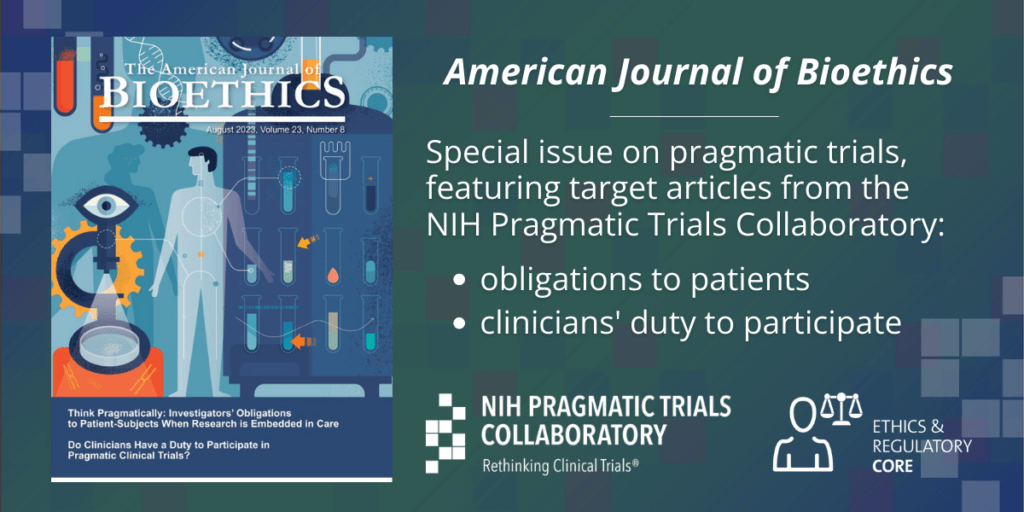 When research and clinical care are deliberately integrated in an embedded pragmatic clinical trial, the nature and extent of investigators’ obligations to patient-subjects are blurred, as is the clinician’s duty to participate is such research. To address these questions, the American Journal of Bioethics (AJOB) recently published commentaries on 2 target articles in a special issue on pragmatic clinical trials. Both of the target articles for the special issue are from the NIH Pragmatic Trials Collaboratory’s Ethics and Regulatory Core.
When research and clinical care are deliberately integrated in an embedded pragmatic clinical trial, the nature and extent of investigators’ obligations to patient-subjects are blurred, as is the clinician’s duty to participate is such research. To address these questions, the American Journal of Bioethics (AJOB) recently published commentaries on 2 target articles in a special issue on pragmatic clinical trials. Both of the target articles for the special issue are from the NIH Pragmatic Trials Collaboratory’s Ethics and Regulatory Core.
Target Article #1
Think Pragmatically: Investigators’ Obligations to Patient-Subjects When Research Is Embedded in Care by Stephanie Morain and Emily Largent
- The authors challenge the notion that the current ethical model can simply be extended to pragmatic research. Instead, the authors suggest a shift to a model that better reflects the team- and institution-based nature of both clinical care and embedded research.
Target Article #2
Do Clinicians Have a Duty to Participate in Pragmatic Clinical Trials? by Andrew Garland, Stephanie Morain, and Jeremy Sugarman
- The authors argue that clinicians have a duty to participate in pragmatic research in usual care but suggest acceptable reasons to refuse, such as a badly designed trial, trial activities that violate the clinician’s conscience, or that the trial will impose excessive burdens on the clinician.
Some of the responses to the target articles are highlighted below.
Blurred Boundaries: Toward an Expanded Ethics of Research and Clinical Care
Megan C. Hailey and Nate Olson
- The authors applaud the articles and offer a range of different research contexts where similar issues apply, including rare disease and genomics research.
Progressing From “Whether to” to “How to” Conduct Pragmatic Trials
Jonathan Casey, Todd Rice, and Matthew Smelner
- The authors state that clinicians are confronted daily with clinical decisions where the best treatment is unknown and suggest that pragmatic trials are best situated to address the problem.
“We believe that the US healthcare system has a basic choice to make: allow arbitrary variation in clinical care and continue to systematically expose patients to suboptimal or harmful therapies indefinitely or structure that variation through pragmatic trials to generate knowledge, reduce variation, and improve outcomes over time.”
Ethical Pragmatic Clinical Trials Require the Virtue of Cultivated Uneasiness
Joel Pacyna and Jon Tilburt
- The authors suggest that softening the default requirement of documenting individual consent removes a primary tool that researchers rely on to ensure the ethical nature of their research. Cultivated uneasiness about waiving consent is warranted and will push researchers to fully examine their decisions and subsequent consequences.
Distinguishing Clinical and Research Risks in Pragmatic Clinical Trials: The Need for Further Stakeholder Engagement
Benjamin S. Wilfond, Sinem Toraman Turk, Stephanie A. Kraft, Elliott M. Weiss, Philip I. Tarr, David Schnadower, and Stephen B. Freedman
- The authors present a case study involving complex interventions to support the target articles’ supposition that ethical frameworks for pragmatic clinical trials need to account for shortcomings in clinical care.
More-Than-Partial Entrustment in Pragmatic Clinical Trials
Henry S. Richardson
- The author strongly supports the obligations of the investigators to report significant, actionable incidental findings about individuals.
End-to-End Integration of Pragmatic Trials Into Health Care Settings
Sarah M. Greene
- The author agrees that pragmatic trials will provide invaluable evidence, but argues that trialists must take care not to interrupt the flow of clinical practice.
For more, see the 15 other commentaries in the special issue of AJOB and the Living Textbook chapter on Consent, Waiver of Consent, and Notification.


